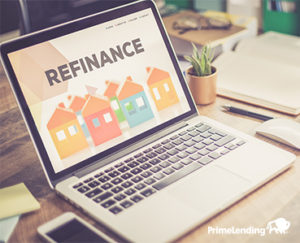Why Refinancing Now Might Make Sense

If you’re wondering whether now is a good time to consider refinancing your mortgage, start by answering these three questions:
- Has your personal or financial situation changed?
- Has your home value increased?
- Have interest rates gone down from when you originally financed your home?
If the answer to any of those questions is “yes,” you may be able to take advantage of low interest rates by refinancing your home.
Currently, we are experiencing low interest rates, but this may not last forever. This combined with higher home values makes refinancing a favorable option for some homeowners. If you’ve built up some equity, are looking to pay off your mortgage quicker or simply want to lower your monthly payments, it’s time to talk about a home loan refinance.
What is a refinance? Mortgage refinancing, in the simplest terms, is replacing your current mortgage with a brand new mortgage – typically one with lower rates or better terms.
Read on for insights into how you might benefit from refinancing your mortgage.
- Lock In Lower Interest Rates – In 2018, mortgage rates fluctuated from low and high, taking the housing market on a roller coaster. This year, however, rates have remained consistent at the lower end of the spectrum, meaning the number of borrowers who can benefit by a refinance is high. Recently, the average rate on the 30-year fixed mortgage hit a three-year low according to Freddie Mac. What does this mean for homeowners? The average borrower could save about $266 per month with a refinance, according to CNBC.
- Eliminate “PMI” – Private mortgage insurance (PMI) protects the lender from losing money if you were to fall into foreclosure. If you made a down payment of less than 20 percent when you financed your home, you may be paying PMI. Depending on whether your home has increased in value and how much of your principle you’ve paid off, you may be able to refinance if your loan balance is 80 percent or less. Dropping mortgage insurance could save you a couple hundred bucks on your monthly payment, so it’s certainly worth considering.
- Pay Off Your Loan Quicker – If you are financially able to make a higher monthly payment, it may be smart to refinance at a slightly higher interest rate but for a shorter term so you can pay off your home loan quicker. Even though you may pay a higher rate, you’ll pay less interest over time, saving you money in the long run.
- Consolidate Debt – Mortgage interest rates are typically lower than other forms of interest. For instance, a “low” credit rate on your credit card is probably somewhere around 12 percent or more, while your mortgage interest may sit anywhere between four and six percent. Did you know you can use your equity to refinance your credit card, student loans and other debt to pay off those debts? Consolidating your debt by refinancing your home can improve your financial situation and make a dent in your monthly debt payments.
- Cover Big Ticket Expenses – Could you use some extra cash? For instance, you may want to remodel your home or cover tuition costs, a cash-out refinance can help make that happen. Cash-out refinancing is an option that allows you to receive part of your home’s equity in the form of cash at the same time you refinance your loan. Here’s how it works: If your original loan was for $300,000 and you still owe $200,000, you have $100,000 in equity. You can receive part of that equity in cash. For example, if you want to take out $25,000 cash, you can refinance your home for $225,000 and receive $25,000 in cash. Your new loan will be larger than your current loan balance, but may be at a lower interest rate than your current loan. Best of all, you can use the money however you want. The cash-out option is a great way to cover the costs of expected or unexpected life events, and any other personal or financial needs you might have.
Before making any decisions, make sure to call your local lender for the best advice as to what may work best for your specific situation!
Source: PrimeLending
